The apologist and spoken word poet on growing up in gangs, finding Christ – and how God convicted him about his old approach to evangelism
Preston Perry is a walking lesson in the power of personal investment.
Growing up, it was a teacher who first spotted his way with words. And despite not growing up in a Christian home, his grandma modelled Jesus through her faithful love and prayers. Then when Perry finally found himself drawn towards the God who had known him all along, it was a cool older dude from a similar background who came alongside him. This man’s emphasis on whole-life discipleship showed Perry that “Christianity was attainable for…a young, black male from the south side of Chicago” whose previous hobbies included selling drugs, “fornicating” and running around with gangs.
Together with his wife, Jackie Hill Perry (author of Gay Girl, Good God, B&H Publishing), Preston hosts ‘With the Perrys’, a podcast in which the couple explore topics that go where other Christians may fear to tread. Orgasms. Male headship. Anger. Same-sex attraction. Nothing is off-limits. With a refreshing level of honesty, and no small amount of banter, their chats feel like sitting in your living room with old friends – albeit ones who know insane amounts of the Bible and can explain complex theological ideas while also whipping up a quick bowl of spaghetti bolognese for the kids on a Wednesday night.
And it’s this honesty, insight and raw life experience that Perry brings to his first book: How to Tell the Truth: The story of how God saved me to win hearts – not just arguments (Hodder). When I describe it as a book on evangelism and apologetics for people who don’t want to read a book on evangelism and apologetics, he laughs. “Yeah, for sure,” he drawls, before explaining that he wanted to write a book “that sparks the minds of the creative saints” while at the same time “talking about theological truths” in a way that is accessible to all.
It’s a book for everyday Christians, Perry says, because every Christian is called to share the story of what God has done in their lives. We often “overcomplicate apologetics and evangelism” he adds, but it’s really very simple: show up, be interested and share God’s love in a way that gives dignity to whoever you are speaking with.
Perry may have a way with words that is beyond the average person’s abilities, but his stories are refreshingly normal. Battling with pride and wanting to win an argument. Conversations that don’t result in an instant conversion. Seemingly insignificant encounters that fly in the face of the miracle stories many share. This, he says, was an intentional decision, designed to counter a church culture that pigeonholes evangelism as numbers at an altar call.
“The Church has conditioned us to want right now results,” he says. “But I think God wants to raise up a generation of evangelists who are OK with being seed planters.” God is looking for obedience, he adds, not a certain personality type or those who think evangelism has only one shape.
Many Christians feel intimidated by the thought of sharing their faith, or ashamed because they don’t know how to defend it – or want to, if they’re being brutally honest. If this is you, Perry has a message he’d like to share. And it’s one you may well enjoy listening to, even if evangelism and apologetics are not normally your thing.
Tell us about your early years.
I grew up in a single-parent home. I didn’t grow up going to church, but I had my grandmother, who’s the only Christian in my family. I heard the gospel for the first time in a house church when I was 16 years old. But it wasn’t until a friend got shot and killed that I felt like the Lord was leading me to himself, and a friend called Gary led me to Christ.
Your grandma and your friend Gary showed you what it was to live out a Christian faith. Is discipleship something you’re passionate about?
When Gary came into my life, he showed me what it looked like to do whole-life discipleship. I didn’t know what Christianity looked like practically, but somebody from my context opened up his life and showed me that it was attainable for me. I thought that if he had a relationship with Jesus, maybe Jesus wanted to have a relationship with me, too.
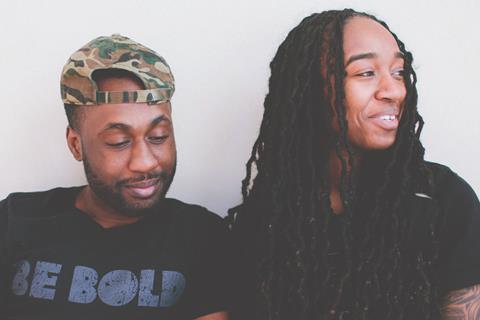
What does discipling others look like in your own life, as someone who has a profile?
Discipleship looks different in different seasons. When I was single, I had the opportunity to walk with many young men. When I got married and had kids, I had to become more selective. God wants us to make disciples, but we can’t make disciples out in the world and forget the people in our home. Relationship with the Lord comes first, our family comes second, our local community comes third. The public stuff has to come last.
Right now, it looks like a couple of guys. You have to be selective, but I’ve always tried to be intentional with the people God has put in my life.
As we’ve become more affluent and individualistic in the West, do you think that has affected discipleship?
I think so. Church has become a business and not a community where people thrive. It has become transactional, like: What can church give me? We have strayed away from what it looks like to live life in community.
I also think our generation has been discipled by social media. They think: I can get what I need not from going into a physical community but by looking on TikTok or Instagram. Social media has its benefits, but one of the downsides is that it can paint a false reality of community.
God wants to raise up a generation of evangelists who are OK with not seeing the fruit of their work
That is a difficult tension for someone who creates social media content. Do you feel called to be an online evangelist?
Well, yeah, I do. I might sound like a hypocrite, but I definitely feel like God has called me to use my platform to teach people how to reach others with the gospel.
People who follow me have heard me say: “Social media isn’t a real place; you need a community of people who are in your life”, so one of the things I try to do with my platform is push people back into a local community.
If anyone listens to your content, they’ll know that being brutally honest is your modus operandi. Is there anything you wouldn’t share online?
Me and my wife both love theology, we both love to think. When friends come over, it always turns into this deep conversation about religion, spirituality, politics, spiritual warfare…
So, when we [started a podcast], we kept the same energy. If you came into our home, you would see conversations that look [similar]…probably a little looser! We’re actually a little more restrained in the podcast!
We don’t share everything. It isn’t a fear of man or of not being real, but it’s just wisdom.
I also think that timing is everything. You can speak true things, but if it’s at the wrong time, you can still do a lot of damage. Sometimes we run the risk of talking about things too prematurely, so we have to be sensitive about what we say, but also when we say it.
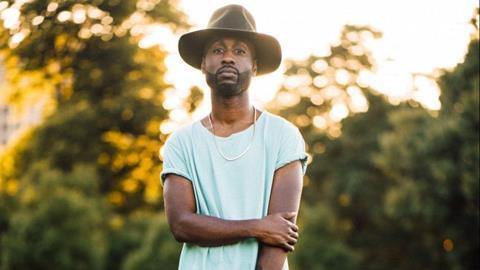
A lot of the evangelism stories you share aren’t an example of an immediate conversion. Why do you choose those stories?
I tried to write my salvation story in a way that showed how God pursues a life and how he uses individuals to draw [you in].
God wants to raise up a generation of evangelists and apologists who are OK with not seeing the fruit of their work until we get to glory. Most evangelists I know don’t really have a lot of salvation stories – but they do have stories about the person they gave the gospel [to], and how they ran into them two years later and they said: “Man, what you said stuck with me, and God used that to draw me to himself.”
I wanted to be honest: I’ve had some people come to Christ, but way more who didn’t.
We use the seed-sowing metaphor a lot in Christian circles. But we still feel the pressure to see conversions. I wonder where that comes from?
I don’t know. I think for the most part, the Church really just has to preach obedience. I don’t think that evangelism has to look a certain way. It’s not all about the altar call.
If God made us all unique, he’s going to use us uniquely. Some people might be called to catch the fish. Some might be called to prepare it, and some to serve it. Evangelists are fishermen. We catch the fish. But when people come into a Christian environment, perhaps for the first time, it’s people with the gift of hospitality that can show a side of Jesus that the evangelist doesn’t.
We should be trying to reach the person in front of us, not defeat the person in front of us
You speak honestly about learning to share your faith rather than just winning an argument. Can you expand on that?
I got challenged by a Jehovah’s Witness five months into being a Christian. To be honest, I was a little arrogant, and I remember being so embarrassed that he knew more than me. My pride rose up and I felt like I had to win this challenge for the Lord.
When I stumped him for the first time in an argument, I was so excited! I was reliving the moment [later], when Gary said: “P, are you still trying to win this guy’s heart?” I was so convicted. I was never trying to win his heart. I was always trying to win the argument.
God used that to shape the way I did apologetics and evangelism. We should be trying to reach the person in front of us, not defeat the person in front of us.
When did you discover poetry?
In school, they assigned all the kids who had behaviour problems mentors, and this nice young lady called Miss Magnus changed my life. She told me that I needed an outlet, and she said: “I want you to write down all your anger. I want to hear how you feel.” She read a couple of lines and said: “This kind of reads poetic.” I didn’t even know what that meant! She said: “Write me a poem.” It was just random, about what I was going through, and she began to cry at her desk [as she read it]. As an eleven-year-old, I’m like: Wow, my words impacted somebody!
She gave me a book by Gwendolyn Brooks, who was the first African American poet to win the Pulitzer Prize. She said: “She came from Chicago. She grew up in a neighbourhood just like yours.” I read her book and I just fell in love with language.
When did you realise it could become a career?
Growing up, the only people who knew I wrote poems were my mum and the girlfriends I was trying to seduce! Then my cousin got married and he wanted me to read one of my poems. That cousin started a spoken word group and we were on YouTube. People started booking me for conferences and events.
And that’s also how you met your wife?
Yeah, we got selected to be a part of the biggest poetry event in the United States. Our poems went viral, and we started getting booked at the same events. That’s how we became friends.
A lot of the content that you and your wife put out speaks about the challenges of your relationship, particularly how difficult the early years of your marriage were. What has been the biggest lesson that you’ve learned?
That if God gave me a spouse that met my every condition, I would never learn how to love unconditionally.
I’m a better disciple, teacher, father, brother and son through the sanctifying relationship that God has given me with another sinful, fallen human being to love. I think God put two stubborn people together, who love him and love one another, to teach us how to be Christian. We want the Lord to sanctify us, and he’s like: OK, get married, I’ll sanctify you! God is teaching me how to love well through this relationship.
What do you hope people take from reading your book?
If we find our identity in the information we know, not the God that we know, we will end up treating people like projects and not image bearers.
Also: be bold. Not rudeness or manufactured boldness for likes or clicks, but real, Holy Spirit-led boldness that only God can give. The last thing is very simple: you can do it. You can share the gospel with a classmate, a co-worker, a cousin, a friend, a stranger. Let’s normalise giving the gospel to the world, so Jesus can come back and get us!
Listen to the full interview on ‘The Profile’ podcast













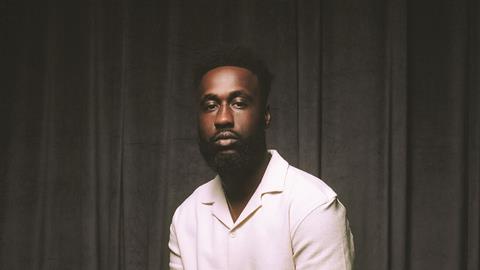

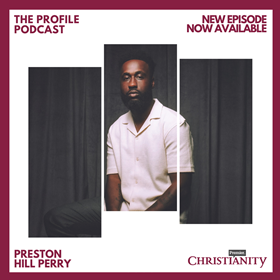
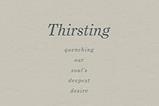



















No comments yet